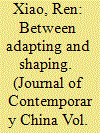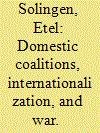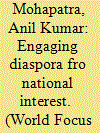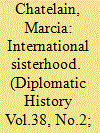|
|
|
Sort Order |
|
|
|
Items / Page
|
|
|
|
|
|
|
| Srl | Item |
| 1 |
ID:
086325


|
|
|
|
|
| Publication |
2009.
|
| Summary/Abstract |
This paper attempts to examine the process of China's participation in regional cooperation in Asia and the factors that affect its participation. It focuses on a changing China-ASEAN relationship that is reshaping Asia. To build a peaceful and stable external environment, China has been making various efforts, political, economic and in the security field, to maintain and upgrade a harmonious and constructive relationship with its neighboring East Asian countries. Politically, China acceded to the Treaty of Amity and Cooperation in Southeast Asia (TAC), essentially accepting the code of conduct stipulated by ASEAN and prompting other regional countries to observe this code. China has been supportive of ASEAN, playing a leadership role in East Asian regional cooperation. China and Asian regional cooperation is an evolving concept and a couple of theoretical points may be taken into account, such as how regional cooperation influences major powers' international behavior and vice versa.
|
|
|
|
|
|
|
|
|
|
|
|
|
|
|
|
| 2 |
ID:
132324


|
|
|
|
|
| Publication |
2014.
|
| Summary/Abstract |
In order to assess the impact of culture on state behavior in international crises, specifically with regard to mediation and its outcome, this study tests hypotheses rooted in both the international relations and the cross-cultural psychology literatures, implementing analysis at both the international-system level and the domestic-state-actor level. At the international system level, the study finds that cultural difference between adversaries affects whether or not mediation occurs during an international crisis but has no effect on tension reduction. At the domestic state actor level, we find that there are certain facets of cultural identity that make a state more or less open to requesting or accepting third-party mediation during an international crisis, but that these facets have no effect on tension reduction.
|
|
|
|
|
|
|
|
|
|
|
|
|
|
|
|
| 3 |
ID:
134087


|
|
|
|
|
| Publication |
2014.
|
| Summary/Abstract |
Recent commentary on the centenary of World War I evokes similarities between Germany then and China now, and between globalization then and now. The nature of dominant coalitions in both countries provides a conceptual anchor for understanding the links between internal and external politics in 1914 and 2014. Coalitional dynamics draw greater attention to agency in debates that all too often emphasize structure, impersonal forces, and inevitability. Two core claims rest on this basic analytical building block. First, despite apparent similarities in domestic coalitional arrangements of putative revisionist challengers-Germany and China-important differences defy facile analogies. China now is not Germany then. Second, the regional coalitional cluster and the global political economy-and hence the links between domestic and external politics-differ across the two periods. The "world-time" against which coalitions operate today is significantly different as well. Thus ahistorical analogies between then and now may not only be imperfect; they can infuse actors with misguided and perilous protocols for international behavior. There is plenty that may recall World War I today but even more that does not, and all must make sure that gap never narrows.
|
|
|
|
|
|
|
|
|
|
|
|
|
|
|
|
| 4 |
ID:
128199


|
|
|
|
|
| Publication |
2014.
|
| Summary/Abstract |
The growing influence of diasporas on foreign affairs and the international behavior of the states has been a worldwide academic finding and a reported fact. As independent actors they have operated as lobbies which have actively influenced homeland (ancestral or kin-states) foreign policies and that of the host lands as well (Shain et al 2003). Especially the developing countries in their mission of development have tried to rope in their communities abroad in the process. This global phenomenon of diaspora-homeland linkage has debate on economic and political systems, national culture and international relations.
|
|
|
|
|
|
|
|
|
|
|
|
|
|
|
|
| 5 |
ID:
132016


|
|
|
|
|
| Publication |
2014.
|
| Summary/Abstract |
After World War II, the Girl Scouts of the United States of America identified international friendship as a key component of its program. In 1957, the Girl Scouts partnered with their international counterparts, the World Association of Girl Guides, to establish Our Cabaña, an international meetinghouse in Cuernavaca, Mexico, where Girl Scouts could meet and befriend fellow members from around the globe. Soon after opening Our Cabaña, leaders noticed that some Girl Scouts repeatedly ignored rules about proper behavior in Mexico, and they feared that Scouts would alienate their Guide sisters and poorly represent the United States. This article asserts that responses to the problems at Our Cabaña demonstrate a critical shift in Girl Scouts' stance on what constituted a good girl ambassador; the organization evolved from promoting manners in intercultural settings to declaring that cultural sensitivity was necessary for girls to become global citizens.
|
|
|
|
|
|
|
|
|
|
|
|
|
|
|
|
|
|
|
|
|